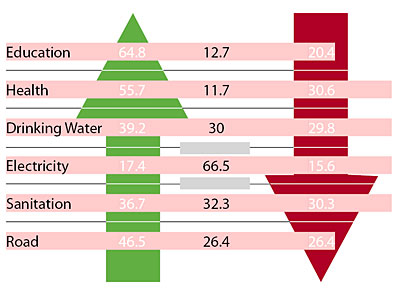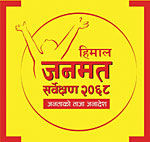 How much have the above services changed in your area in the last few years? |
Elected local councils were dissolved in July 2002 by the Sher Bahadur Deuba government because he didn't want the UML to continue its local dominance. The VDCs, DDCs and municipalities remain without elected representatives to this day.
The popular perception in the media might put constitution drafting at the top of the agenda, but results of the Himalmedia nationwide public opinion survey this week reveals that there is extreme dissatisfaction among people about the prolonged absence of democracy at the local level.
The demand for elected local bodies is so strong that nearly half the respondents have asked for immediate elections to the local bodies. This is quite remarkable considering that of those polled, half feel that local representatives of the political parties are as bad as their leaders at the centre.
When Gyanendra Shah conducted local elections in February 2006, most of the people refrained from voting. This was during the war, and many felt it was a sham election anyway. But ever since 1990, Nepalis have shown repeatedly that they have tremendous faith in democracy and freedom. But the general mood of the 4,000 or so respondents surveyed last week shows that when the country is being held hostage by vested political interests at the top, people want accountability from their leaders, at least those at the grassroots.
The absence of elected representatives at the local bodies has not only stalled the local development works, it has also bred corruption. The all-party mechanism, which is entrusted with overseeing local affairs in the interim period, has become an exclusive club of powerful three parties, discredited for its lack of transparency and accountability.
The survey reveals that people are largely unaware about the all-party mechanism, and most still go to their old elected representatives for any local matters. Those who have heard about it are largely dismissive of the all-party mechanism, and the sense is that they are no substitute for elected representatives.
 |
Local bodies are vital to all democracies, and their continuous absence in Nepal has weakened the institution at its roots. The political parties who speak of institutionalising democracy seem to have forgotten its fundamentals: the foundations have to be laid before the structure can be erected. The Himalmedia poll also shows that although the political landscape looks messy, people are very clear about the way forward: they want local elections to kick-start local development again as it did in the early 1990s. They also overwhelmingly want the parties to stop politicising development at the district and village level.
If the local perception is that health, education and transportation have improved in the past five years, imagine how much more progress we'd have made with more accountable elected leaders at the local level.
There is nothing in the interim constitution that prevents us from going for local elections. There is never a wrong time for democracy.
Read also:
Nation's pulse
Few surprises, EDITORIAL
Netas, are you listening?, DAMBAR K SHRESTHA in JHAPA



